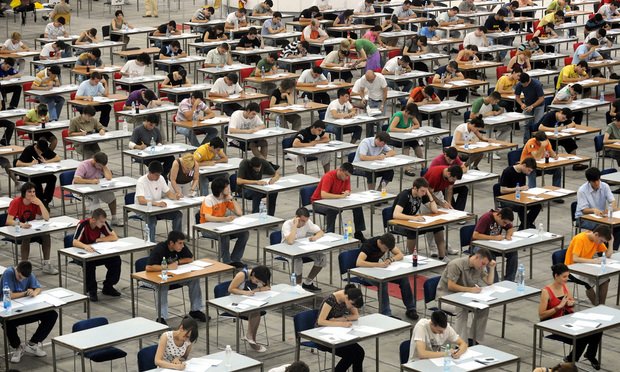Letter to the Editor: Cancel the Bar Exam
Brit Benjamin, an adjunct lecturer at Santa Clara University School of Law, writes it's time let go of the test as a barrier to a law license since coronavirus has made administering the bar exam impractical, unsafe and even less predictive of a lawyer's ability than it usually would be.
April 10, 2020 at 05:19 PM
5 minute read

Few attorneys think of ourselves as powerful members of an exclusive cartel, but that's what we are. The global coronavirus pandemic, and the needs created by resulting shifts in how we live, work and earn, have catalyzed a radical reassessment of practices taken for granted for too long. The bar exam, which secures the interests of our cartel, is ripe for a change.
Lawyers and law professors understand the bar exam is more rite of passage than test of competence. Now, it poses an unnecessary barrier to entry for third-year law students who are burdened by shelter-in-place requirements, financial pressures and psychological stress. Rather than protecting the public, the bar exam constricts the supply of attorneys, fueling the crisis of access to justice plaguing California's most vulnerable. When we eliminate the bar exam, the remaining measures the State Bar uses to filter for competent, moral attorneys will better protect the interests of the public than keeping the exam does. Eliminating the exam is simply the right thing to do.
At best, the bar exam is a poor filter for competence and a rite of passage for young lawyers. At worst, it is an insidious form of security theater whose ostensible, noble purpose in protecting the public conceals the actual role the exam plays: protecting the financial interests of a cartel of established lawyers by constraining supply (and thus driving up the hourly rate we can charge). The latest research indicates that "over 20 million Californians—at all income levels—lack access to legal services." Letting in thousands of legally educated, practice-trained young people willing to work for less would be a boon for the public and increase price and quality competition within the profession.
Now is the time to let go of this bad proxy, as coronavirus has made administering the bar exam impractical, unsafe and even less predictive of a lawyer's ability than it usually would be.
The emergency diploma privilege is already the subject of petitions across California (and other states), letters to Gov. [Gavin] Newsom and California State Bar Admissions Board urge the revival of the policy, previously employed after the 1906 earthquake and during World War II. A diploma privilege would authorize recent graduates to practice law without sitting for the bar exam. The developing movement in support of a temporary diploma privilege does not go far enough: the exam should be eliminated permanently.
California's metaphorical bar is higher than any other state: the July 2018 pass rate was 40.7% overall. The bar exam is so tangential to the practice of law that graduates spend three months and thousands of dollars preparing to cram and regurgitate a fantasy body of law in a test-specific style. Law schools are concerned with preparing students to practice law with conscience, and the bar exam has little to do with the real-world demands of practice. Few licensed attorneys would disagree, so why are we so protective of this dysfunctional tool?
The solution to this mess of inefficiencies and perverse incentives is simple: cancel the bar exam. Temporarily, while instituting an emergency diploma privilege, and then permanently, if there is no resultant decrease in the quality of membership of the California bar. Canceling the July administration and allowing for licensure-by-diploma will empower thousands of young lawyers to prove their competence where it counts: in practice. It will inject a cohort of competitively priced practitioners into the legal marketplace, something California's population desperately needs.
It is the least disruptive, most humanitarian path forward for these graduates, and it's an opportunity to improve our institutional practices. Let's treat this as an experiment, and have the State Bar gather data, tracking metrics such as client complaints, sanctions and other indications of overall attorney competence, and compare them to past cohorts who were licensed by exam.
Will these young attorneys, licensed by diploma, serve their clients just as well? We have every reason to expect that they will. California's historical experience with the emergency diploma privilege led to no discernible increase in client complaints or malpractice suits. This is not surprising, because the bar exam is a relatively recent development in the history of legal services, and just one small part of our overall system for ensuring attorney competence.
Those who agree with my logic but remain uncomfortable with my proposal should consider if they might be suffering from effort-justification bias. We studied, struggled, passed and celebrated, so it must be the best way. If the bar exam is abandoned, will our efforts have been in vain?
It's natural to feel this way, but to act on it would be for our cartel to wrongfully deny these 2020 graduates entry to the profession. Instead, we should rise to the occasion, as Californians repeatedly have done, by taking radical steps toward more compassionate and efficient governance. An experiment in removing barriers to entry would serve the justice-starved public far more than the bar exam does, and it would raise the bar for professional organizations across the country struggling with how to adapt in a pandemic-shaken world.
 Brit Benjamin (Courtesy photo)
Brit Benjamin (Courtesy photo)Brit Benjamin is an adjunct lecturer teaching advanced legal writing and appellate advocacy at Santa Clara University School of Law.
NOT FOR REPRINT
© 2025 ALM Global, LLC, All Rights Reserved. Request academic re-use from www.copyright.com. All other uses, submit a request to [email protected]. For more information visit Asset & Logo Licensing.
You Might Like
View All
Assessing the Second Trump Presidency’s Impact on College Sports


LSAT Administrator Sues to Block AI Tutor From Using ‘Famous, Distinctive’ Test Prep Materials
3 minute readTrending Stories
- 1We the People?
- 2New York-Based Skadden Team Joins White & Case Group in Mexico City for Citigroup Demerger
- 3No Two Wildfires Alike: Lawyers Take Different Legal Strategies in California
- 4Poop-Themed Dog Toy OK as Parody, but Still Tarnished Jack Daniel’s Brand, Court Says
- 5Meet the New President of NY's Association of Trial Court Jurists
Who Got The Work
J. Brugh Lower of Gibbons has entered an appearance for industrial equipment supplier Devco Corporation in a pending trademark infringement lawsuit. The suit, accusing the defendant of selling knock-off Graco products, was filed Dec. 18 in New Jersey District Court by Rivkin Radler on behalf of Graco Inc. and Graco Minnesota. The case, assigned to U.S. District Judge Zahid N. Quraishi, is 3:24-cv-11294, Graco Inc. et al v. Devco Corporation.
Who Got The Work
Rebecca Maller-Stein and Kent A. Yalowitz of Arnold & Porter Kaye Scholer have entered their appearances for Hanaco Venture Capital and its executives, Lior Prosor and David Frankel, in a pending securities lawsuit. The action, filed on Dec. 24 in New York Southern District Court by Zell, Aron & Co. on behalf of Goldeneye Advisors, accuses the defendants of negligently and fraudulently managing the plaintiff's $1 million investment. The case, assigned to U.S. District Judge Vernon S. Broderick, is 1:24-cv-09918, Goldeneye Advisors, LLC v. Hanaco Venture Capital, Ltd. et al.
Who Got The Work
Attorneys from A&O Shearman has stepped in as defense counsel for Toronto-Dominion Bank and other defendants in a pending securities class action. The suit, filed Dec. 11 in New York Southern District Court by Bleichmar Fonti & Auld, accuses the defendants of concealing the bank's 'pervasive' deficiencies in regards to its compliance with the Bank Secrecy Act and the quality of its anti-money laundering controls. The case, assigned to U.S. District Judge Arun Subramanian, is 1:24-cv-09445, Gonzalez v. The Toronto-Dominion Bank et al.
Who Got The Work
Crown Castle International, a Pennsylvania company providing shared communications infrastructure, has turned to Luke D. Wolf of Gordon Rees Scully Mansukhani to fend off a pending breach-of-contract lawsuit. The court action, filed Nov. 25 in Michigan Eastern District Court by Hooper Hathaway PC on behalf of The Town Residences LLC, accuses Crown Castle of failing to transfer approximately $30,000 in utility payments from T-Mobile in breach of a roof-top lease and assignment agreement. The case, assigned to U.S. District Judge Susan K. Declercq, is 2:24-cv-13131, The Town Residences LLC v. T-Mobile US, Inc. et al.
Who Got The Work
Wilfred P. Coronato and Daniel M. Schwartz of McCarter & English have stepped in as defense counsel to Electrolux Home Products Inc. in a pending product liability lawsuit. The court action, filed Nov. 26 in New York Eastern District Court by Poulos Lopiccolo PC and Nagel Rice LLP on behalf of David Stern, alleges that the defendant's refrigerators’ drawers and shelving repeatedly break and fall apart within months after purchase. The case, assigned to U.S. District Judge Joan M. Azrack, is 2:24-cv-08204, Stern v. Electrolux Home Products, Inc.
Featured Firms
Law Offices of Gary Martin Hays & Associates, P.C.
(470) 294-1674
Law Offices of Mark E. Salomone
(857) 444-6468
Smith & Hassler
(713) 739-1250







